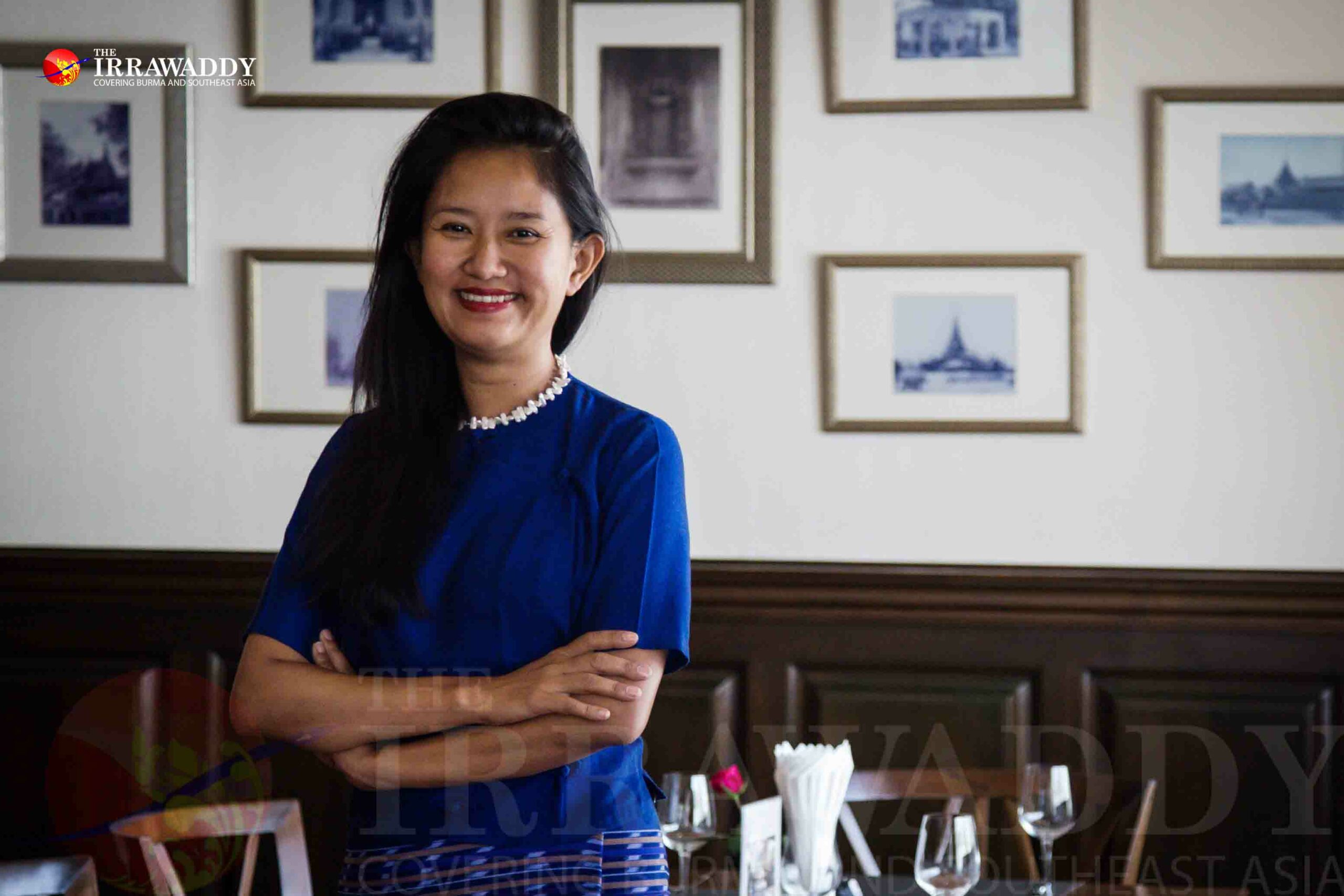YANGON —Myanmar’s tourism sector has been booming since the country began opening its doors to the outside world in 2011, after decades of isolation under military rule. Tourist arrivals surged from 800,000 in 2011 to 4.7 million in 2015. But the sector had a setback late last year with the outbreak of violence in Rakhine State, which saw hundreds of people killed and drove almost 700,000 Rohingya to neighboring Bangladesh. In the wake of the violence, tourists cancelled their trips. Many raised safety concerns and moral objections.
The Irrawaddy spoke recently with Daw May Myat Mon Win and Daw Yin Myo Su about the country’s tourism sector, the Rakhine conflict’s impact on the industry and their efforts to counter the setback.
Daw May Myat Mon Win is chairwoman of Myanmar Tourism Marketing, vice-chairwoman of the Myanmar Tourism Federation, and general manager of the Chatrium Hotel Royal in Yangon. Daw Yin Myo Su is managing director of the Inle Princess Resort in Shan State and the Mrauk-U Princess Resort in Rakhine State, and founder of the Inle Heritage Foundation.

Daw May Myat Mon Win, how did the latest crisis in Rakhine State impact the tourism market?
Followed the crisis, people were asking whether it was safe and ethical to travel to Myanmar. As for safety, Myanmar has restricted areas, but all tourist destinations are safe to visit. Another concern that travelers raised was ethics, from a humanitarian point of view. The sensationalized headlines and pictures of the crisis had an effect. The impact was mostly from Western countries. They felt it was unethical to visit Myanmar. But there are also those from other countries who don’t really mind. They see travel as separate from politics and that conflicts happen in their countries as well as in other places.
There are many who believe they should not visit Myanmar because that would constitute support for the human rights abuses in Rakhine. What do you think of that?
We can’t say nothing happened in Rakhine. But it is hard to differentiate the news that is true and false. When people make assumptions based on their personal biases, it is very harmful to the situation. What I would like to say is don’t politicize tourism. Our country has faced a lot of challenges and difficulties. The peace process has not yet achieved its goal. It’s been going on for a very long time. It is difficult for them to understand Myanmar’s complex problems. But if they really want to help us, they need to support tourism. The Rakhine conflict started because of poverty. The community there has been excluded and isolated. Tourism has a very broad scope. It’s not just hotels. It also has an indirect economic impact on local small businesses like restaurants, vendors, souvenir shops. It can drive the local economy, which benefits different groups, different ethnicities and different religions in the country.
Is the market still suffering from the crisis?
It is. Travelers usually make decisions and forward bookings three months, six months or 10 months before their trips. But this is not the end of the road. We can’t just despair and do nothing. We need to continue promoting destinations and a positive view of the country to counter the negative views. We need to give our country a facelift. So far we have not been able to do much. That’s why the negative publicity has taken over. It is important to make a priority of countering it. And in giving the country a facelift, tourism has to play a key role.
What are the plans for 2018?
We expect most of the increase in visitors to come from Asian countries this year. We have marketing activities throughout this year in Japan and will target the world’s largest outbound tourism market — China. Not only Myanmar, but also the US, UK and French are enticing Chinese tourists. We plan to have marketing activities there. But we have a small budget while other countries have a decent budget for tourism marketing. Neighboring Thailand spends hundreds of millions of dollars to promote itself globally. For instance, at ITB Berlin (the world’s largest tourism trade fair) Indonesia spent $1.5 million while we had only $150,000 to $100,000 allocated from the Ministry of Hotels and Tourism and collected another $50,000 from private operators. This must be considered seriously.

Daw Yin Myo Su, how is the tourism sector doing right now?
The number of visitors from Europe has declined significantly, as well as from [other] Western countries. We have seen an increase in arrivals from Asian countries. But most Westerners stay at least two weeks to four weeks because they have come from quite far. But Asians, they come mostly for weekends, so the length of stay is different. If we ask whether it is good or bad, the situation is not good right now.
We are all working to attract visitors. Some offer discounts. Some target more Asian countries and do promotions there. There are promotions for domestic tourists also, because locals are traveling more than before. Everyone is struggling to cover operating costs, maintenance and salaries for staff. Looking at the positives, we can improve our skills as we struggle to attract travelers, unlike before. But it is also important to attract good and responsible travelers for sustainable tourism, and not just focus on quantity.
You are in Inle and Mrauk-U, which are among the country’s most popular tourist destinations. What impact has the Rakhine conflict had there?
Mrauk-U has been the worst. Throughout all of 2017 Mrauk-U saw only about 2,000 foreign visitors, based on entrance fee collection data. That number is quite low compared with recent years. It has declined by nearly half. We had to run at a loss in Mrauk-U. Because I have 100 staff there, I have done my best to keep running. We have heard words that we have never heard before — mass murderers, intolerant nation, unkind, no sympathy. While the majority of people think like that, how can we ask and entice people to visit? It makes sense to think like a traveler going on vacation. Why would they want to visit a place where the news is all terrible? But the problem is that there are those who think Yangon and Inle are very close. If they aren’t familiar with the map of Myanmar, there might be some who think the whole nation is in crisis. But because the conflict is happening in Rakhine, we can’t assume the whole nation is like that.
Many have asked whether it is ethical to visit Myanmar. What is your view on that?
Isolation is not a solution. If the economy gets worse and education does not improve, a similar problem could happen again. The problems in Rakhine are mainly because of the failure to integrate and invest in the education of the communities there. It has undone the work of the past 70 years. It can’t be resolved in seven days, seven months, or even seven years. A long-term commitment is needed.
How important is the tourism sector to the country?
Just at my resorts, there are 400 [staff] for the small, 23-room Mrauk-U resort and the 36-room Inle resort. And I’m talking only about hotels. There are also tourism-related businesses: weaving, tour guides, souvenir shops, handicrafts sellers. And if we talk about restaurants, there are also vegetable and meat sellers, transportation, and so on. The drop in visitors affects them all. And if people become hungry and scared as a result, that could indirectly promote extremism.
What are the main changes needed to develop the tourism sector?
Number one is to develop infrastructure for better transportation and telecommunications at the [tourist] destinations, and to develop direct flights from overseas to the main destinations. We also need to maintain the fast-tract online tourist visas that were introduced. Cooperation between the ministries needs to be improved because their directives on travel restrictions often change. For example, tourists come to visit an area because there are no restrictions, but once they arrive it’s changed. It is not good for the country’s image. We also need to provide a platform for small [businesses] with a clear direction and capacity building for skilled laborers in the industry.
















